News
KUBS News
Father of `Working Woo Young Woo`... Bear Better CEO Kim Jung-ho`s Special Lecture at Entrepreneursh
2023.06.09 Views 3153 국제실
Father of 'Working Woo Young Woo'... Bear Better CEO Kim Jung-ho's Special Lecture at Entrepreneurship Academy
On Tuesday, May 16th, the Entrepreneurship Academy Special Lecture (hereinafter referred to as the "special lecture") for the 2023-1 semester, organized by the Startup Research Institute (Director: Moon Jung-bin) of the KUBS (Dean: Kim Sang-yong), was held at LG-POSCO SUPEX Hall. The special lecture was delivered by Kim Jung-ho, the CEO of Bear Better, who is a co-founder of the search portal Naver and currently serving as the CEO of Brian Impact. Kim Jung-ho, who graduated from the Department of Trade in 1985, spoke as a senior to his juniors in the business administration department after a gap of four years.
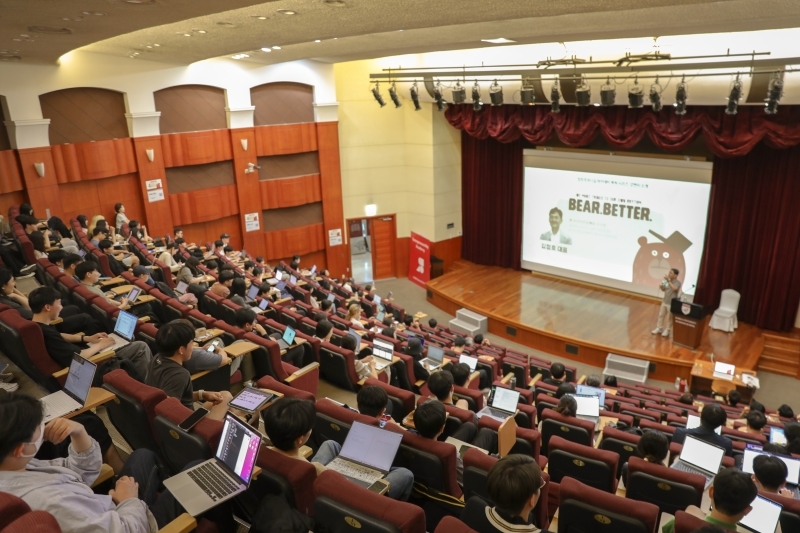
First, CEO Kim Jung-ho introduced his own life story. After graduating from Korea University, he joined Samsung and worked there for 10 years before resigning. In response to the question of why he worked for 10 years, Kim Jung-ho explained, "After working for 10 years, they added one month's salary to the severance pay." He revealed that he saved all his monthly salaries to accumulate as much money as possible. In addition to living on overtime pay, business trip expenses, and award money, Kim Jung-ho received the Presidential Award four times and was promoted twice during his 10 years at Samsung, showing that he was a recognized talent within the company.
As of June 1999, having saved up a total of one billion won, Kim Jung-ho fully committed to the startup Naver. Despite fully dedicating himself to the entrepreneurship for 4 years, sleeping and eating on a makeshift bed, the situation at that time was that there were about 130 search service companies. However, Naver gained an advantage in the search portal market through mergers and acquisitions (M&A), and only Yandex in Russia, Yahoo! in Japan, Baidu in China, and Naver in Korea has survived up to this day.
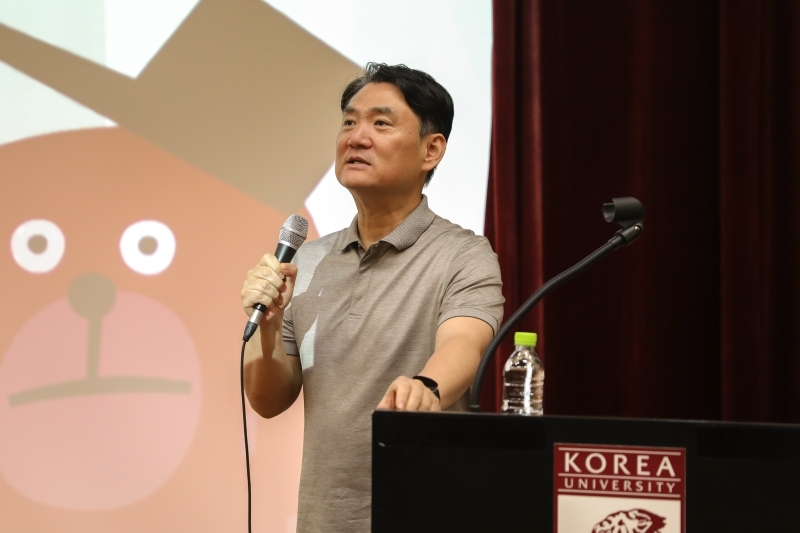
Afterward, Kim Jung-ho invested in startups through stock investments and venture capital (VC) and has a close connection with sharing donations. Since 1995, he has been donating funds for construction and scholarships to Korea University. During the recent expansion of the April 18 Memorial Hall, he donated 1.5 billion won to install elevators for students visiting the Disability Student Support Center and Career Development Center. Regarding these donations, Kim Jung-ho expressed his pride, saying, "I used to support a Malaysian student who entered Korea University with tuition and etc., until he graduated with a master's degree. I felt proud when I heard the news that he is now teaching students as a professor in Malaysia after obtaining a Ph.D. in the UK."
A Q&A session followed. Students and aspiring entrepreneurs asked CEO Kim Jung-ho questions about investment, entrepreneurship, the value of startups, and social enterprises, which are organized and introduced below.
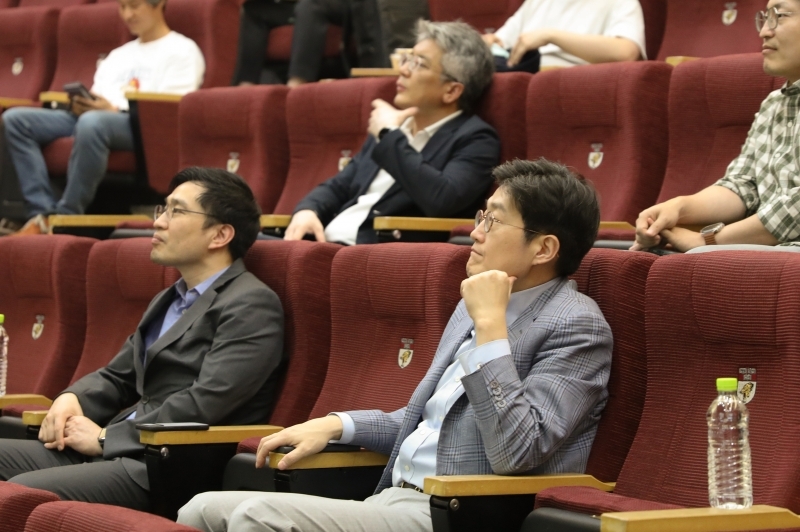
Q. The current situation in the real economy is difficult. What strategies are recommended for the venture industry and startups?
A. Would anybody be able to answer that question accurately? (Laughs) I think that question is from a macro-level perspective, and startups are more micro-level, so there may not be a need to worry too much about the global environment. Instead of worrying about that, it's better to focus on questions like "What am I offering?", "What is the purpose of my business?", "What is my competitive advantage?", and "How can I survive?". If you pay too much attention to the global environment, it might not be helpful. It's simple. A company is like a restaurant. You need to provide what is in line with the trends. So, it would be better not to be too sensitive to capital or investment sentiment.
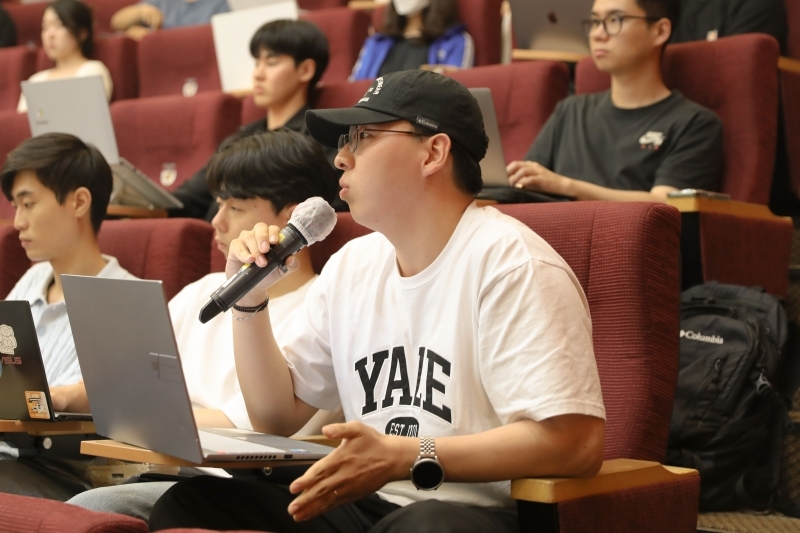
Q. You worked at Samsung for 10 years and were a co-founder of Naver. Do you think it is better to work for a company for a long time before starting a venture, or is it better to start immediately if you have money and ideas?
A. Both options have their pros and cons. What I advise my children is that I would recommend working for a large company for about five years. That's because, in my case, I also worked for 10 years and then started a venture, and during your time at a large company can provide valuable opportunities with regards to working on significant projects. Of course, it may not be the work you desire, but in my opinion, it is necessary to experience the responsibility of managing large scale projects. I don't recommend staying for an extended period. If you have an undergraduate degree, gaining experience for about 7 to 10 years is advisable, and if you have a master's or Ph.D. degree, around 5 to 7 years of experience might be beneficial.
However, if my children have good ideas and capital and ask me about starting a venture, I think I would encourage them to do so. By starting a business, they can experience generating revenue, paying salaries, and observing the market's response to their ideas. It's like experiencing a "project" in itself. So, I don't think I can give a definitive answer on which option to choose.
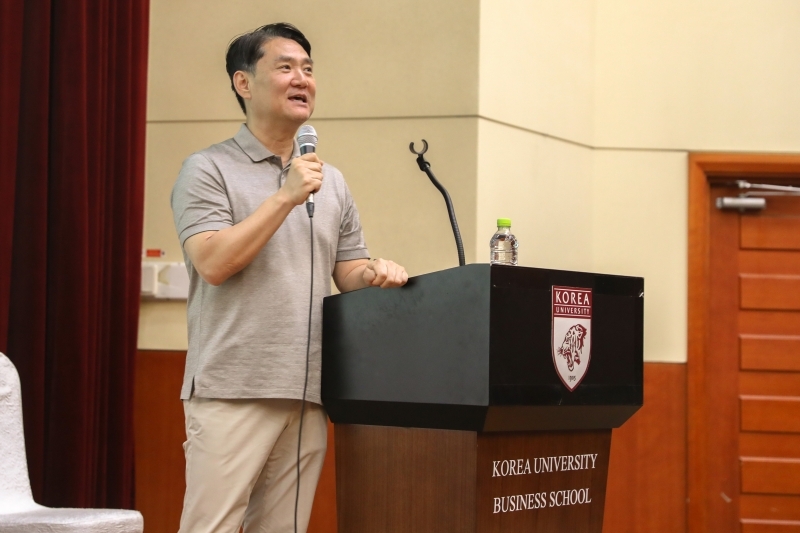
Q: Did you brand Bear Better with any particular interest or appeal to consumers?
A: First of all, I see the business models of non-profit social enterprises and for-profit ventures as the same. If the business model of a non-profit social enterprise falls behind, it cannot survive. People will think ‘How pitiful?’ but they won’t buy the products. Therefore, Bear Better has a solid economic business model and currently has contracts with 600 major companies.
In Korea, there is a mandatory law for employing people with disabilities for companies with 50 or more employees. They must employ disabled individuals, which should account for 3.1% of the total workforce. If they fail to meet this requirement, they must pay a penalty, which is around 60% of the minimum wage. So, I came up with a business model.
It's called the "Bravo Beaver," which is a standard workplace for people with disabilities funded by corporations. Bear Better directly employs people with disabilities, while the Bravo Beaver is operated through investments from companies to establish standard workplaces for people with disabilities. From the perspective of large corporations, even though Bravo Beaver's products seem more expensive than conventional ones, they can purchase them without paying penalties. In fact, it turns out to be more cost-effective. It's a win-win business model for both companies and us.
Q. Did your experiences during your undergraduate years help you?
A. I would say it helped me "a lot." Let me give you an example. I had experience working part-time at a draft beer pub. Since a glass of draft beer is 500ml, you can pour 50 glasses from 20L. If you calculate simply, you would need 40 glasses, or to pour 50 glasses, you would need 25L. But there's foam in the beer, and that part of it goes away. So, I could pour an additional 10 glasses. At that time, I was paid 500 won per hour, and I thought, if I could increase my value-added by more than twice, I should try pouring 50 glasses. I tried pouring a maximum of 15 glasses more than the initial 40 glasses.
So, I demanded that they increase my hourly wage by more than double. From the owner's perspective, if they hired me, they could save the cost of the original beer extract, so they would have more money left. That's how you increase your competitiveness and value-added. I learned a lot of these things during my undergraduate years, and I applied them in my entrepreneurship. I would like to encourage students to gain diverse experiences through part-time jobs or other activities while attending university.
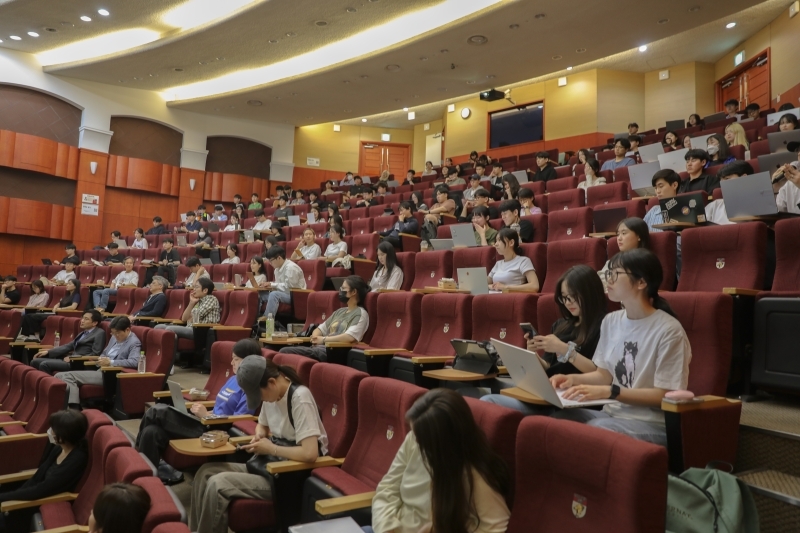
Q. Do you have any advice for your juniors?
A. Nowadays, 1 out of 4 newly hired employees in large companies leave within 1 to 2 years. The reason is that they feel the work doesn't suit them after studying hard, graduating from university, and getting a job. Based on my experience and observing my junior colleagues, if you only think about what benefits you personally and calculate everything based on that, you may miss out on values that would be more beneficial to yourself.
For me, even though i started my part-time job due to a difficult situation, it ended up becoming an asset because of the various experiences I gained. The people I worked with and the tasks I experienced while working in the company ultimately helped me reach where I am today. When facing any situation, I would advise approaching it with the mindset of thinking that the current experience could benefit you in the future, even if it may seem challenging or not suitable for you at the moment.


